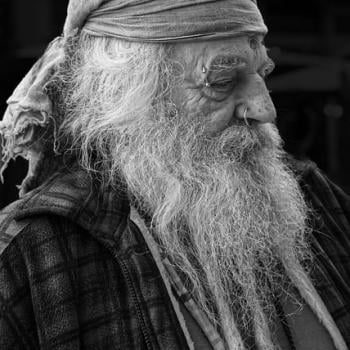Virtuous Living, Dharma: Young Hindus are taught to live a life of duty and good conduct. They learn to be selfless by thinking of others first, being respectful of parents, elders, and swamis, following divine law, especially ahimsa, mental, emotional, and physical noninjury to all beings. Thus they resolve karmas.
Pilgrimage, Tirthayatra: Young Hindus are taught the value of pilgrimage and are taken at least once a year for darshana of holy persons, temples, and places, near or far. They learn to be detached by setting aside worldly affairs and making God, Gods, and gurus life's singular focus during these journeys.
Rites of Passage, Samskara: Young Hindus are taught to observe the many sacraments that mark and sanctify their passages through life. They learn to be traditional by celebrating the rites of birth, name-giving, head-shaving, first feeding, ear-piercing, first learning, coming of age, marriage, and death.
Hinduism Has Always Accepted Adoptives and Converts
It is sometimes claimed that one must be born in a Hindu family to be a Hindu, that one cannot adopt it or convert from another faith. This is simply not true. The acceptance of outsiders into the Hindu fold has occurred for thousands of years. Groups as diverse as local aborigines and the invading Greeks of Alexander the Great have been brought in. Entering Hinduism has traditionally required little more than accepting and living the beliefs and codes of Hindus. This remains the basic factor in the process, although there are and always have been formal ceremonies recognizing entrance into the religion -- particularly the namakarana samskara, or naming rite in the case of adoptives and converts, and the vratyastoma, vow-taking rite, in the case of those returning to one sect or another of the Hindu religion.
The most compelling testimony to Hinduism's acceptance of non-Hindus into its fold is history. Possibly the most often quoted exposition of the subject appears in the Complete Works of Swami Vivekananda (Vol. 5, p. 233), in an interview called "On the bounds of Hinduism," which first appeared in the Prabuddha Bharata in April 1899:
Having been directed by the Editor, writes our representative, to interview Swami Vivekananda on the question of converts to Hinduism, I found an opportunity one evening on the roof of a Ganges houseboat. It was after nightfall, and we had stopped at the embankment of the Ramakrishna Math, and there the swami came down to speak with me. Time and place were alike delightful. Overhead the stars, and around, the rolling Ganga; and on one side stood the dimly lighted building, with its background of palms and lofty shade-trees. "I want to see you, Swami," I began, "on this matter of receiving back into Hinduism those who have been perverted from it. Is it your opinion that they should be received?"
"Certainly," said the swami, "they can and ought to be taken." He sat gravely for a moment, thinking, and then resumed. "The vast majority of Hindu perverts to Islam and Christianity are perverts by the sword, or the descendants of these. It would be obviously unfair to subject these to disabilities of any kind. As to the case of born aliens, did you say? Why, born aliens have been converted in the past by crowds, and the process is still going on.
"In my own opinion, this statement not only applies to aboriginal tribes, to outlying nations, and to almost all our conquerors before the Mohammedan conquest, but also to all those castes who find a special origin in the Puranas. I hold that they have been aliens thus adopted.
"Ceremonies of expiation are no doubt suitable in the case of willing converts, returning to their Mother-Church, as it were; but on those who were alienated by conquest -- as in Kashmir and Nepal -- or on strangers wishing to join us, no penance should be imposed."
"But of what caste would these people be, Swamiji?" I ventured to ask. "They must have some, or they can never be assimilated into the great body of Hindus. Where shall we look for their rightful place?"
"Returning converts," said the swami quietly, "will gain their own castes, of course. And new people will make theirs. You will remember," he added, "that this has already been done in the case of Vaishnavism. Converts from different castes and aliens were all able to combine under that flag and form a caste by themselves -- and a very respectable one, too. From Ramanuja down to Chaitanya of Bengal, all great Vaishnava teachers have done the same."
"Then as to names," I enquired, "I suppose aliens and perverts who have adopted non-Hindu names should be named newly. Would you give them caste names, or what?" "Certainly," said the swami thoughtfully, "there is a great deal in a name!" and on this question he would say no more."




